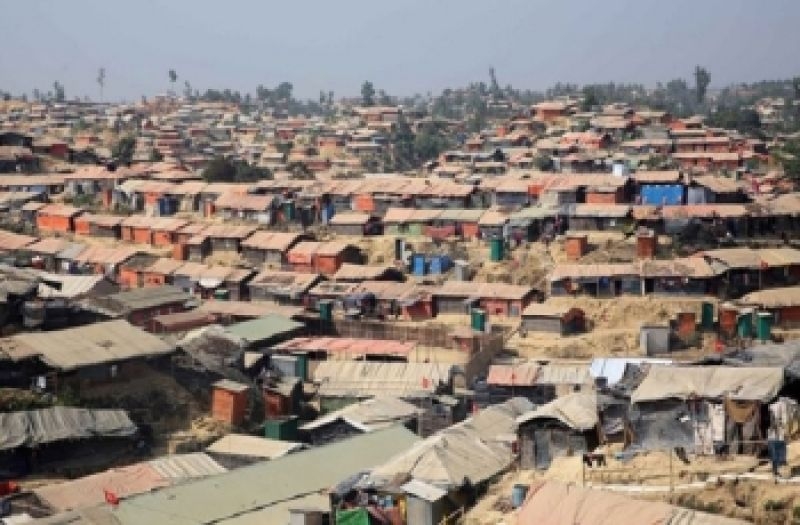- India Sees 9% Drop in Foreign Tourists as Bangladesh Visits Plunge |
- Dhaka Urges Restraint in Pakistan-Afghan War |
- Guterres Urges Action on Safe Migration Pact |
- OpenAI Raises $110B in Amazon-Led Funding |
- Puppet show enchants Children as Boi Mela comes alive on day 2 |
Sustained support must to prevent disaster for Rohingya refugees
UNHCR’s Executive Committee Chairperson says

Rohingya Camp in Ukhiya
Cox’s Bazar, 3 April 2025 – DHAKA – H.E. Marcelo Vázquez-Bermúdez, Permanent Representative of Ecuador to the UN in Geneva and Chairperson of UNHCR’s Executive Committee, underscored UNHCR’s steadfast commitment to supporting Rohingya refugees in Bangladesh during his recent visit to the camps in Cox’s Bazar. He also highlighted the criticality of the humanitarian response by UNHCR and its partners to address the complex challenges faced by over a million refugees in Bangladesh.
During his four-day visit, Vázquez-Bermúdez witnessed firsthand the immense scale of the humanitarian crisis---now in its eighth year--- as he engaged with refugee groups across different camps to understand their assistance needs and protection challenges. In Nayapara camp, he heard from Rohingya who had recently fled targeted violence in Myanmar’s Rakhine State." The stories they told were heart-wrenching, with many including old men in tears as they recounted their ordeals," said Vázquez-Bermúdez. "I will ensure that these voices are
heard by Member States of UNHCR’s executive board, providing much-needed visibility to their plight."
In discussions with men and women community leaders in the Kutupalong area, Vázquez-Bermúdez heard concerns about insecurity in the camps and fears over premature repatriation in adverse conditions. Meeting with young refugees receiving English and vocational training in a skills development centre in Teknaf, he saw signs of hope despite tremendous difficulties. "These young people are eager to contribute and build a better future, if given the opportunity," he said.
He heard from the refugees about their strong desire to return to their homes in Myanmar, when the conditions are in place: "They want to help build thriving, developed societies when they go back, and we have to continue supporting them so they can fulfill their dreams.” At the same time, he emphasized, “Sustainable peace and security in Rakhine are essential to ensure they are not forced to flee again."
Vázquez-Bermúdez expressed deep concern over the drastic reduction in funding that all humanitarian partners are currently facing. "We must prevent a disaster," he urged. “More than 1 million Rohingya refugees are dependent on humanitarian assistance for the most basic needs of food, water, cooking fuel, and shelter. States and other stakeholders must act now to foster the self-reliance of refugees in Bangladesh, until it is safe for them to go back to their homeland." He praised the generosity of Bangladesh and the host communities, while recognizing the challenges faced by the country during its own transition. “The humanitarian community cannot abandon the Rohingya nor Bangladesh during this time,” he said.
The Ambassador emphasized the need for new measures to be considered and implemented to address the ongoing crisis, particularly in the area of self-reliance and livelihoods. He noted that the 2025-26 Joint Response Plan (JRP) for the Rohingya Humanitarian Crisis, jointly launched on 24 March in Geneva by the Government of Bangladesh, UNHCR and IOM, represents “the first-ever multi-year funding appeal for the Rohingya Response. The plan, which brings together 113 partners, seeks $934.5 million in its first year to reach some 1.48 million people, including Rohingya refugees and host communities,” he stated.
Vázquez-Bermúdez concluded by expressing appreciation for the tireless efforts of UNHCR staff working on the ground to save lives and promised to "continue promoting solidarity and understanding of the situation of the Rohingya refugees in Bangladesh and their needs".

